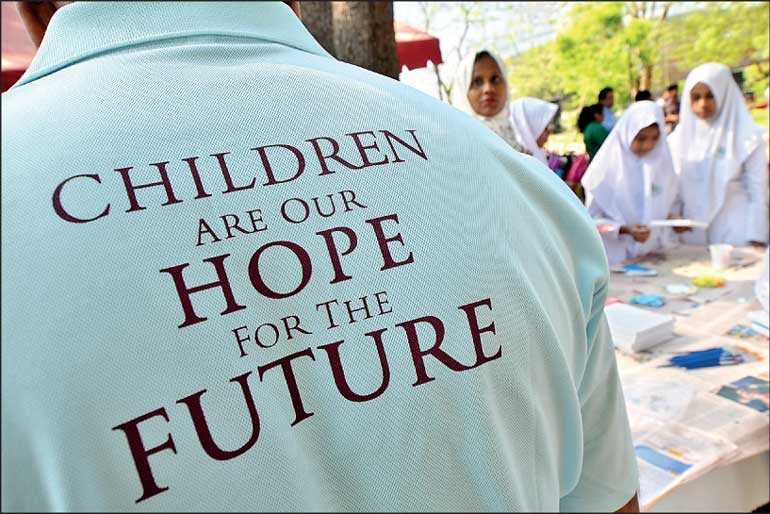Sunday Feb 22, 2026
Sunday Feb 22, 2026
Saturday, 15 August 2020 00:11 - - {{hitsCtrl.values.hits}}

Applying your child to maintain constant A’s or pressuring him to excel in an academic environment, regardless of his age, may create tension and anxiety in your child or teen
“Care about your children. Just bless them instead of worrying, as every child is the little Buddha who helps his parents to grow up”
– Gautama Buddha
Schools are considered temples of learning, where the next generation is nurtured and nourished suitably to meet the demands of the society and the nation. A child spends 12-14 years of his/her life in school. These years see a child’s transformation from childhood to adolescence, and then to adulthood. 
Within this span of a dozen or more years, the child learns about the world, the different forces that govern it, the different kinds of people and their languages and cultures. From thereon, he/she is prepared to meet the world with knowledge, courage and to innovate and lead.
But sadly, today schools create a ‘robot-like’ next generation whose learning is just limited to fact and theories and limits the child’s ability to think. Children are loaded with books and are forced to learn things even before understanding them.
Students are taught things they usually are supposed to learn at a higher grade, much earlier than what their little brains could accommodate. Unusual number of periods and umpteen number of subjects are imposed on little children, forcing them to learn all of this in one year. In this regard, international private schools, especially take the cake. It is more foolish than remarkable to put pressure like this on little minds.
Children live in a pressure-cooker like atmosphere today. The sacrifice of childhood at the altar of pedagogical rigours begins sometimes even before the age of three, in nursery school where children are given homework – numbers to learn, alphabets to decipher – and then subjected to stringent tests.
So the work-load – in the form of homework – further burdens parents and children.
It’s a vicious circle. All these pressures on little minds have given rise to psychosomatic illnesses in children. We hear every day how parents echo their sentiments, “My heart just breaks when I see my child loaded with many books and with homework.” The tragedy is that those children have no childhood left.
The burden imposed on parents are such that they dole out exorbitant amounts of money to these schools and colleges that they too expect value for money. We have to tell the parents that their absurdly high expectations are harming their children psychologically as well as their achievements. They should be made aware of the fact that setting expectations too high is counter-productive. Although parental aspiration can help improve a child’s academic performance, excessive parental aspiration can be poisonous.
As a result hundreds and thousands of school children in this country are today engaged in a rat race to the finish - a debilitating competition taking its toll on the quality of life and mental well-being of children.
It also scraps off recreation periods like physical education, co-curricular and intra-curricular activities to squeeze in more hours of Science, Mathematics, History, Geography and Computer studies. The poor students, are hardly left with any time for play or to do crafts or arts to refresh and rejuvenate their minds.
Children forget to enjoy the small pleasures of life like enjoying the first rains, playing football just for the fun of it, rather than for getting the best players award, indulging in home-grown and indigenous traditional games, so on and so forth.
Letting a child be what he or she is, while at the same time monitoring and channelling their strengths and talents is what schools are supposed to do, is what is expected of parents and teachers. Many children who are pressured into excelling by parents or teachers may gradually withdraw from them and shut down, say psychologists.
Such children may think they’re not important or loved enough by parents unless they are perfect, a standard to which few, if any, children can achieve. If you constantly demand A’s from your child, you may be sending the wrong message. Encourage him to do his best, but don’t act as if your child didn’t work or study hard enough if he gets a B instead of an A.
The constant struggle to get high grades is very high on the agenda of every parent. Even students who score in the 70s are often judged failures. Gone are the days when 50 per cent ensured a pass; when 60 per cent was considered very good, and 70, sheer brilliance. There are bright and sensitive children who score well into the 70s. But invariable stands only ranked 10th in the class. What a disaster.
Bringing up the next generation in the right way is no easy task and does not simply include reading to them from textbooks and drawing diagrams on the board but includes talking to them at personal and understanding them for what they are. Applying the right amount of pressure can mould the raw talent into a reliable and wonderful personality but excess pressure can damage the item and the raw talent would be lost to both his/her near and dear ones as well as to the society.
Applying your child to maintain constant A’s or pressuring him to excel in an academic environment, regardless of his age, may create tension and anxiety in your child or teen. In older children, anxiety to perform academically may lead to eating disorders, excessive anxiety or worry, and erotic behaviour.
A child who is constantly berated for his or her grades or shamed when he or she brings home the report card may ultimately begin to feel anger or resentment towards their parents. Invariably you may notice your child engaging in increasingly antisocial behaviours such as refusal to follow rules or guidelines, lying, acting out, verbal outbursts and refusing to do homework.
Often, children are unable to express their feelings about stress, anxiety or even their performance in school. Such children often continually strive to impress, encourage pride, and receive the rewards of your love and adulation. If they do not get the expected ratings in their subjects, they often feel they have let you down. So be very much aware of your child’s emotional and mental outlook and health while still encouraging him to do his best.
In this context, we would appeal to the Government and the Ministry of Education, that they impose strict rules, regulations, terms and conditions on these private international colleges – streamline their syllabuses in accordance with their tender age and also have some sort of continuous monitoring as to their academic and extra-curricular activities.
Because they are our children and they are our future and the future of our country.